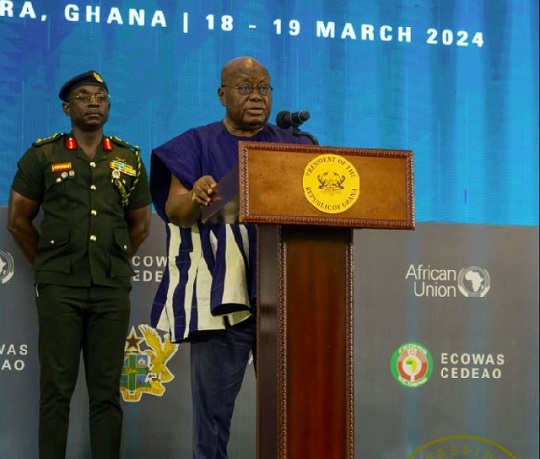President of the Republic, Nana Addo Dankwa Akufo-Addo, has in the interest of the dire implications on peace and security on the continent and the imminent threat to West Africa's long-standing integration experience, called for a rapid resolution of the ensuing impasse between the regional blocs on the continent and the breakaway member states of Mali, Niger and Burkina Faso.
President Akufo-Addo believes fervently, that “the interlinked nature of our security, in all its dimensions,” amidst the ever-increasing threat of terrorist and terrorism related activity in the Sahel and rising instability requires all “hands-on deck.”
That is why it is necessary, according to him, for the “AU Department of Political Affairs, Peace, and Security to work closely with ECOWAS to identify ways to prevent the withdrawal of the states that have signalled their intention to leave.”
President Akufo-Addo has been speaking at the Second Reflections Forum on Unconstitutional Changes of Government, organised by the African Union Department of Political Affairs, Peace and Security, and Peace and Security Council, on Monday, 18th March 2024, in Accra, Ghana.
In the face of the growing scourge of unconstitutional regimes across the continent, a meeting of such nature has become necessary for a thorough assessment of implementation outcomes on the landmark declaration adopted at the Accra Forum in March 2022, and given further impetus at the 16th Extraordinary Summit in Malabo, in May of the same year, that outlines Africa's collective vision and plans for addressing this matter.
With provisions made to enhance the effectiveness of Africa’s collective response to the spread of coups, the Accra Declaration and the Malabo Summit decisions, according to President Akufo-Addo, “affirmed our collective commitment to the principle of zero tolerance for coup d’états.”
He was happy to note that, though a member state seems bent on undermining the Accra Declaration, and the collective stance on term extensions and unconstitutional changes of government, “Africa’s position on this matter, in letter and spirit, is an unequivocal condemnation of any form of ascent to power that is outside constitutional provisions and inimical to democratic norms.”
He recalled the dire situation four years ago when the Accra Meeting had to be convened following the suspension of four Member States of the Union due to the occurrence of unconstitutional changes of governments in their territories.
“Today, two years later, the situation has worsened. As we gather here, six Member States of the Union have been suspended for the same reasons. This is an extraordinary occurrence in our efforts to safeguard the ideals of democracy in Africa,” he added.
Continuing, he said, “what is more is that the territories within which the two coups in 2023 occurred have created a geographical spread, which many refer to as a “coup belt,” stretching from the Atlantic coast, here in West Africa, through the Sahel to the Red Sea coast in the Horn of Africa.”
Whilst wondering why only incremental progress has been made thus far, he was of the stern belief that, identifying why things have not worked is a major step in knowing how to make things work in this situation.
Exhibiting a disposition of concern, he questioned why it does appear that a good percentage of the population of countries affected by coups in recent times celebrated the occurrence of the phenomenon and queried further to know if it is a case that African citizens are welcoming to some coups or that show was just a celebration of change.
He was convinced that the celebrations are more about change than support for coups as various research institutions, including the Kofi Annan International Peacekeeping Training Centre and the Institute for Security Studies, have duplicitously shed light on this.
“When elections are not truly free and fair, and legal tactics are employed to undermine the spirit of democracy, when legal loopholes are exploited to subvert constitutional provisions that guarantee inclusion and participation, and when state apparatus is used to muzzle freedom of expression, citizens begin to feel that democratic processes have taken them hostage and often celebrate anything that looks like an end to their present predicament.”
He urged the bloc secretariats, elected officials, international civil servants, think tanks, and civil society actors to provide policymakers with innovative and practical recommendations and avoid prescriptive solutions looking at the complexities associated with addressing the challenges, as well as institute a “critical group of individuals within and outside the multilateral frameworks that our AU officials should be able to call upon to engage and co-generate response options, when necessary, to de-escalate crises.”
Whilst commending the AU Commission for the comprehensive report on peace and security it presented to the Assembly in February, he challenged them to go further than the diplomatically couched recommendations to provide the Assembly with critical points on what they must do.
President Akufo-Addo called on the AU and regional bodies to invest in developing our national institutions, and empowering citizens with the requisite knowledge to demand compliance and accountability from their governments and recognised the grave dangers faced by some of those, who have dared to engage at the national level.
“In those instances, where the defenders of governance and constitutionalism face repression, we must raise our voices in their defence as a collective. We cannot abandon the messengers we send when they are confronted with danger because of the messages they deliver, he concluded.





